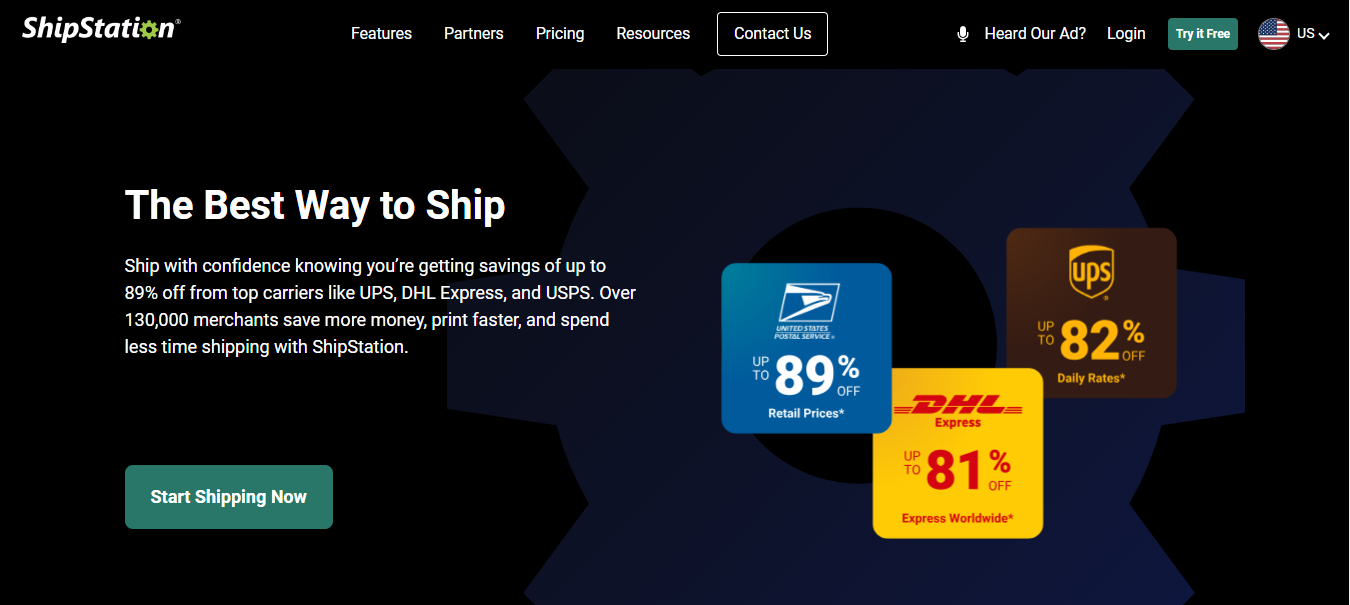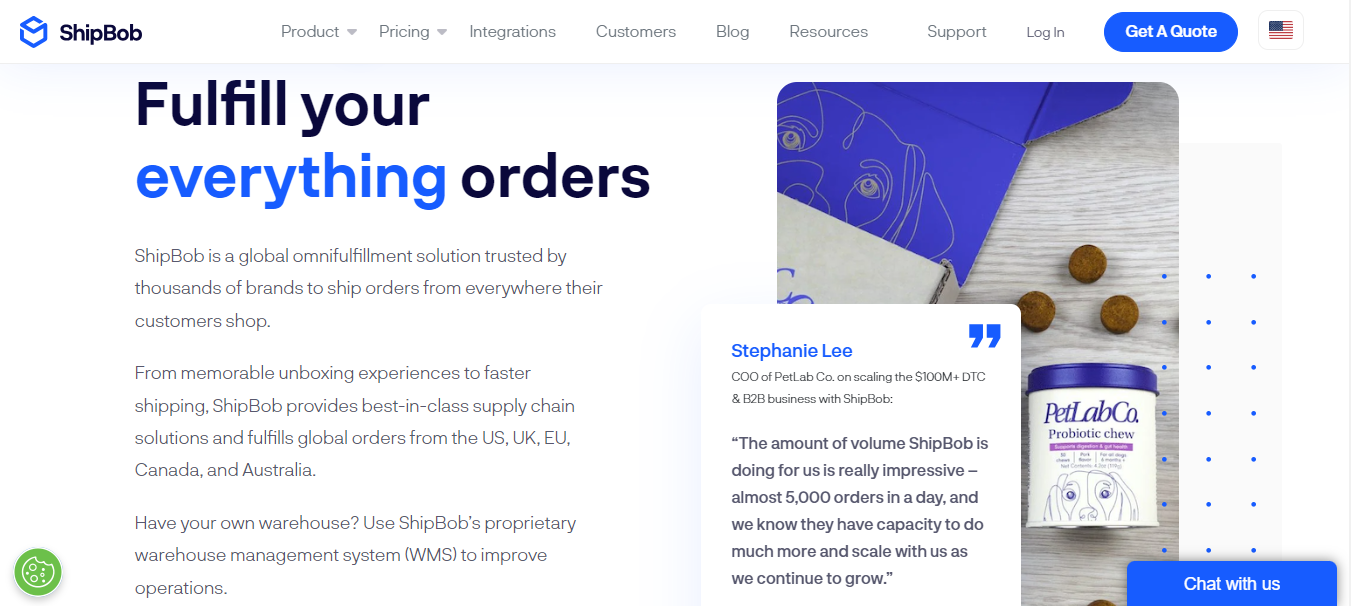In the bustling world of e-commerce, efficient shipping is a cornerstone of success. As online businesses strive to meet customer expectations for fast and reliable deliveries, the role of shipping software becomes increasingly pivotal. This article serves as a comprehensive guide to help businesses navigate the landscape of shipping software, with a focus on the top five solutions that have proven instrumental in enhancing e-commerce success.
What Is Shipping Software For E-commerce?
Shipping software for e-commerce is a sophisticated and specialized suite of digital tools designed to revolutionize the intricate logistics associated with the shipping process in the realm of online retail. Unlike generic shipping solutions, which may lack the tailored features necessary for the dynamic world of e-commerce, these dedicated platforms serve as the digital backbone for managing and optimizing the entire shipping workflow. From order fulfillment to label generation and real-time tracking, shipping software for e-commerce acts as a centralized hub, providing businesses with the capabilities to orchestrate their shipping operations with precision and efficiency.
In essence, shipping software for e-commerce is a strategic enabler that empowers online businesses to navigate the complexities of shipping logistics seamlessly. It offers a comprehensive set of functionalities that cater specifically to the unique challenges faced by e-commerce enterprises, addressing critical aspects such as multi-carrier support, real-time tracking, and integration with various e-commerce platforms. This software is not merely a tool; it is a tailored solution crafted to enhance the overall shipping experience for both businesses and their customers.
Benefits Of Using Shipping Software For E-commerce
1. Streamlined Operations
One of the primary advantages of incorporating shipping software into the e-commerce ecosystem is the profound impact it has on streamlining day-to-day operations. The software serves as a centralized command center where businesses can effortlessly manage essential tasks such as order processing, label generation, and real-time tracking.
This centralized approach eliminates manual bottlenecks, reducing the likelihood of errors and delays in the shipping process. By providing a cohesive platform for managing the entire shipping workflow, e-commerce businesses can achieve a higher level of organizational efficiency.
2. Enhanced Customer Experience
A key driver of success in the competitive e-commerce landscape is the ability to provide an unparalleled customer experience. Shipping software plays a pivotal role in this regard by offering features that directly contribute to customer satisfaction.
Accurate shipping estimates, real-time tracking, and proactive communication are among the features that enhance the overall customer experience. The transparency and reliability facilitated by shipping software instill confidence in customers, fostering loyalty and positive brand perception.
3. Cost Savings
In the realm of e-commerce, where operational efficiency directly impacts the bottom line, cost savings are a crucial consideration. Shipping software contributes significantly to cost savings through various mechanisms.
Efficient route optimization, for instance, minimizes travel time and reduces fuel costs, directly impacting the operational budget. Additionally, features such as automation and real-time rate comparisons empower businesses to make cost-effective shipping decisions, ensuring that resources are utilized optimally.
4. Global Reach
For e-commerce businesses with aspirations of global expansion, the ability to navigate international shipping challenges is paramount. Shipping software with global capabilities enables businesses to extend their reach beyond borders.
By offering features such as international shipping options, customs management, and compliance with international regulations, this software opens new avenues for growth. E-commerce businesses can tap into diverse markets and cater to a global customer base, contributing to increased revenue and market presence.
5. Data-Driven Decision-Making
In the data-driven era, the insights derived from analytics play a pivotal role in shaping business strategies. Shipping software for e-commerce generates a wealth of valuable data related to shipping performance, customer preferences, and operational bottlenecks.
Businesses can leverage this data to make informed decisions that optimize their shipping strategies. Whether it’s fine-tuning delivery routes, identifying peak shipping times, or understanding customer behavior, the analytical capabilities of shipping software empower businesses to improve their operations continuously.
The Top 5 Shipping Software For E-commerce
Shipping software is a solution that allows you to manage all of your shipping needs in one place. The best shipping solutions for your e-commerce business will not only help you track orders and create labels but also provide other useful features, such as managing inventory and automating invoices. Here are five options to consider when choosing a shipping software:
1. ShipStation

ShipStation stands as a formidable force in the e-commerce shipping software landscape, offering a comprehensive set of features that cater to the diverse needs of online retailers. The platform’s detailed overview reveals a user-friendly interface that belies its robust capabilities. ShipStation excels in providing real-time shipping rates, a crucial feature for businesses seeking to optimize shipping costs. Its prowess extends to order and inventory management, where businesses can efficiently process orders, manage stock levels, and gain valuable insights into their overall operations.
ShipStation’s seamless integration with various e-commerce platforms is a standout feature, ensuring that businesses can effortlessly connect their online stores for a synchronized shipping workflow. The automation tools offered by ShipStation streamline label generation, order processing, and communication with customers, reducing manual intervention and enhancing overall efficiency. The platform’s versatility makes it suitable for businesses of varying sizes, from startups to enterprise-level operations.
Price: ShipStation’s pricing model is tiered, accommodating businesses of different sizes. It offers a range of plans with varying features and monthly shipping volumes.
Notable Features
- Multi-Carrier Support: ShipStation supports multiple carriers, allowing businesses to choose the most cost-effective shipping options.
- Order and Inventory Management: The platform provides tools for efficient order and inventory management, ensuring a seamless workflow.
- Automation: ShipStation offers automation features for label generation, order processing, and communication with customers.
Summary
ShipStation’s versatility, real-time features, and seamless integration capabilities make it a standout choice for e-commerce businesses. However, businesses should consider their specific needs and budget constraints when opting for ShipStation.
Watch Out For: While ShipStation is known for its features, businesses should evaluate the pricing plans to ensure they align with their shipping volume and budget.
2. Shippo

Shippo positions itself as a shipping platform that thrives on simplicity and efficiency. The detailed overview of Shippo reveals a platform designed with a user-friendly interface, making it accessible to businesses with varying levels of technical expertise. The emphasis on real-time shipping rates is evident, providing businesses with the ability to make informed decisions on the most cost-effective shipping options available.
Shippo’s label printing capabilities streamline the shipping preparation process, allowing businesses to generate labels with ease. The platform’s international shipping features are noteworthy, enabling businesses to expand their reach globally. Shippo’s commitment to simplifying the shipping process is evident in its design and functionality, making it an attractive option for businesses seeking a straightforward and effective shipping solution.
Price: Shippo’s pricing model is flexible, with pay-as-you-go options based on the number of shipments. This makes it an attractive choice for businesses with varying shipping volumes.
Notable Features
- Real-Time Shipping Rates: Shippo provides real-time shipping rates from various carriers, allowing businesses to choose the most cost-effective options.
- Label Printing: The platform offers easy label printing, simplifying the shipping preparation process.
- International Shipping: Shippo facilitates international shipping, enabling businesses to reach a global customer base.
Summary
Shippo’s focus on simplicity, real-time rates, and international shipping capabilities positions it as a valuable shipping solution for e-commerce businesses. However, businesses should assess whether Shippo aligns with their specific shipping needs.
Watch Out For: While Shippo is user-friendly, businesses should ensure that the platform offers the necessary features for their shipping requirements.
3. Easyship

Easyship distinguishes itself as a comprehensive shipping platform with a particular focus on simplifying cross-border shipping challenges. The detailed overview of Easyship reveals a platform designed to cater to businesses looking to expand their global reach. Its specialization in cross-border shipping is evident in features that address the complexities associated with international deliveries.
Easyship’s real-time courier rates feature provides businesses with insights into shipping costs, allowing them to make informed decisions. The platform’s emphasis on customs and duties management ensures compliance with international regulations. Easyship’s design promotes an integrated approach to shipping logistics, making it a valuable asset for businesses with a global outlook.
Price: Easyship’s pricing model includes a combination of shipment fees and additional costs based on the services used. The platform caters to businesses of various sizes with different shipping needs.
Notable Features
- Cross-Border Shipping: Easyship specializes in cross-border shipping solutions, simplifying the complexities associated with international deliveries.
- Real-Time Courier Rates: The platform provides real-time rates from various couriers, enabling businesses to choose the most suitable options.
- Customs and Duties Management: Easyship includes tools for managing customs and duties, ensuring compliance with international shipping regulations.
Summary
Easyship’s emphasis on cross-border shipping, real-time rates, and customs management makes it an ideal choice for e-commerce businesses with a global focus. However, businesses should assess whether Easyship aligns with their specific international shipping requirements.
Watch Out For: While Easyship excels in cross-border shipping, businesses should evaluate the platform’s additional costs and ensure they align with their budget.
4. ShipBob

ShipBob emerges as a prominent player in the e-commerce fulfillment and shipping arena, offering end-to-end solutions for online retailers. The detailed overview of ShipBob reveals a platform designed to streamline the entire order fulfillment process. From inventory management to order picking, packing, and shipping, ShipBob provides a comprehensive suite of services.
The platform’s focus on e-commerce integration is evident, ensuring seamless compatibility with popular online stores. ShipBob’s commitment to offering end-to-end fulfillment services positions it as a one-stop solution for businesses seeking a holistic approach to shipping logistics. The platform’s customization options for packaging further contribute to enhancing brand identity.
Price: ShipBob’s pricing model is based on factors such as order volume, storage space, and additional services required. The platform caters to businesses of varying sizes, from startups to enterprise-level operations.
Notable Features
- End-to-End Fulfillment: ShipBob provides a complete suite of services, including inventory management, order processing, and shipping.
- E-commerce Integration: The platform seamlessly integrates with popular e-commerce platforms, ensuring a smooth and efficient workflow.
- Custom Packaging: ShipBob offers options for custom packaging, allowing businesses to enhance their brand identity.
Summary
ShipBob’s focus on e-commerce fulfillment, integration capabilities, and custom packaging features makes it a compelling solution for businesses seeking comprehensive shipping services. However, businesses should evaluate whether ShipBob aligns with their specific e-commerce and fulfillment requirements.
Watch Out For: While ShipBob excels in e-commerce fulfillment, businesses should consider whether their specific industry focus aligns with the platform’s strengths.
5. Ordoro

Ordoro positions itself as a shipping and inventory management platform tailored to the needs of e-commerce businesses. The detailed overview of Ordoro unveils a platform designed to simplify the shipping process through efficient order management, label generation, and inventory tracking.
Ordoro’s focus on order management is a standout feature, providing businesses with tools to ensure a streamlined workflow. The platform’s label-generation capabilities contribute to simplifying the shipping preparation process, allowing businesses to generate labels seamlessly. Additionally, Ordoro includes features for inventory tracking, enabling businesses to manage stock levels effectively and prevent stockouts.
Price: Ordoro’s pricing model is tiered, with different plans based on the number of orders and additional features required. The platform caters to businesses with varying shipping volumes.
Notable Features
- Order Management: Ordoro provides tools for efficient order management, ensuring a streamlined workflow.
- Label Generation: The platform offers easy label generation, simplifying the shipping preparation process.
- Inventory Tracking: Ordoro includes features for inventory tracking, allowing businesses to manage stock levels effectively.
Summary
Ordoro’s focus on order management, label generation, and inventory tracking makes it a reliable choice for e-commerce businesses. However, businesses should assess whether Ordoro aligns with their specific shipping and inventory management requirements.
Watch Out For: While Ordoro offers essential features, businesses should ensure that the platform provides the necessary scalability for their growth.
Factors To Consider When Choosing Shipping Software For E-commerce
1. Scalability
One of the fundamental factors to consider when selecting shipping software for e-commerce is scalability. The chosen solution should possess the flexibility to grow seamlessly with the evolving needs of the business. As e-commerce enterprises expand their operations, the software should accommodate increased order volumes, additional shipping routes, and changing logistical requirements. Scalability ensures that the chosen shipping software remains a valuable asset, capable of adapting to the dynamic nature of the e-commerce landscape.
2. Integration Capabilities
The ability of shipping software to seamlessly integrate with other tools and platforms used by e-commerce businesses is a critical consideration. E-commerce operations often rely on a spectrum of software, including inventory management systems, order processing platforms, and customer relationship management (CRM) tools. Choosing a shipping solution with robust integration capabilities ensures a cohesive and streamlined workflow. Compatibility with popular e-commerce platforms further contributes to an efficient and interconnected operational ecosystem.
3. User-Friendly Interface
The user-friendliness of shipping software is a significant factor, especially in the context of diverse teams within e-commerce businesses. An intuitive and easy-to-navigate interface ensures that team members, regardless of their technical expertise, can swiftly adopt and leverage the full capabilities of the software. A user-friendly design reduces the learning curve, promoting faster onboarding and effective utilization of the shipping software across the organization.
4. Cost Considerations
The financial aspect is a crucial element in the selection of shipping software for e-commerce. Evaluating the overall cost of implementing the software involves more than just considering the subscription or licensing fees. Businesses should assess additional costs related to customization, training, and ongoing support. A comprehensive understanding of the total cost of ownership ensures that the selected shipping software aligns with the budgetary constraints of the e-commerce enterprise.
5. Customer Support
The level of customer support provided by the shipping software vendor is a critical factor influencing the overall user experience. Robust customer support ensures that issues are addressed promptly, questions are answered comprehensively, and users have access to resources that facilitate effective usage of the software. Reliable support minimizes disruptions to shipping operations, contributing to a positive user experience. Before committing to a particular shipping software solution, businesses should assess the responsiveness and quality of customer support provided by the vendor.
6. International Shipping Capabilities
For e-commerce businesses with a global outlook, evaluating the international shipping capabilities of the software is paramount. The chosen solution should facilitate seamless international shipping, providing features such as real-time international rates, customs management, and compliance with international shipping regulations. This ensures that the e-commerce business can navigate the complexities of cross-border logistics efficiently, tapping into new markets and serving an international customer base.
7. Industry Focus
The specific industry focus of the shipping software is another factor to consider. Some solutions may cater more effectively to certain e-commerce industries, such as fashion, electronics, or beauty products. Assessing whether the shipping software aligns with the unique requirements and nuances of the e-commerce industry in which the business operates ensures a better fit. A solution tailored to the specific industry focus enhances the relevance and effectiveness of the shipping software for the e-commerce enterprise.
Conclusion
In the dynamic landscape of e-commerce, choosing the right shipping software is a strategic decision that can significantly impact the success of your online business. The top five shipping software solutions—ShipStation, Shippo, Easyship, ShipBob, and Ordoro—offer unique features tailored for different e-commerce needs. By understanding the benefits, nuances, and potential considerations associated with each software, e-commerce businesses can make informed decisions that align with their specific shipping requirements. As the e-commerce industry continues to evolve, leveraging the power of innovative shipping software becomes paramount in ensuring seamless and efficient shipping operations, contributing to the overall success of online retailers.









